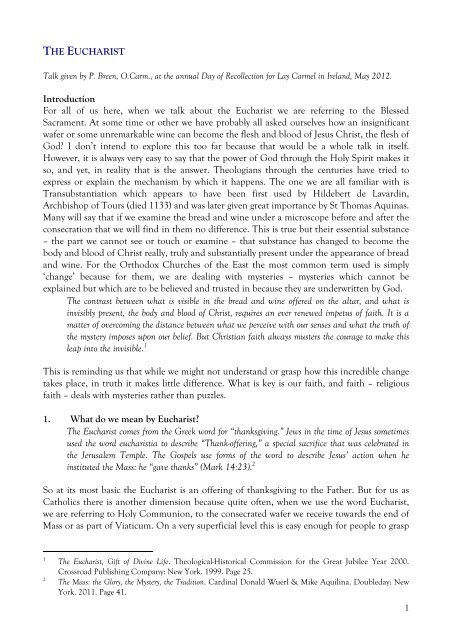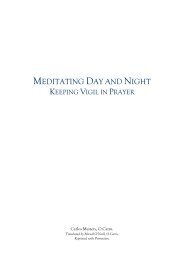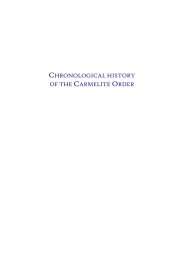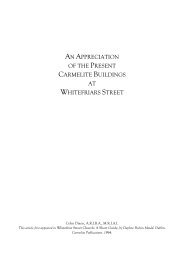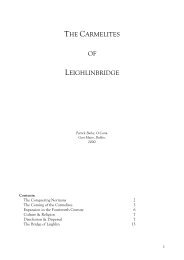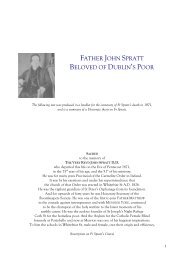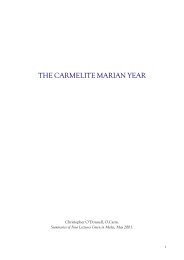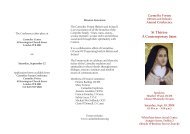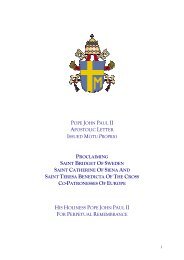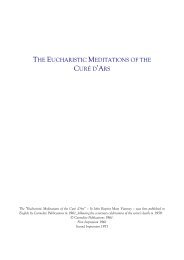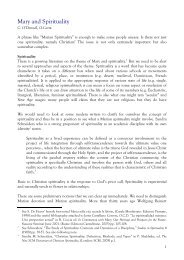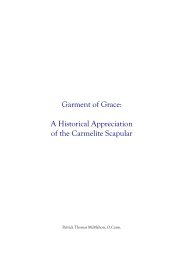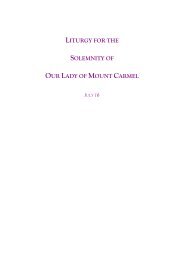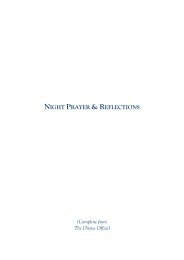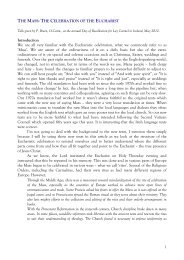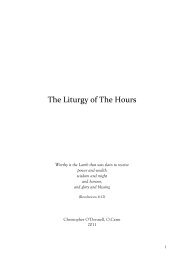THE EUCHARIST Introduction For all of us here, when we talk about ...
THE EUCHARIST Introduction For all of us here, when we talk about ...
THE EUCHARIST Introduction For all of us here, when we talk about ...
You also want an ePaper? Increase the reach of your titles
YUMPU automatically turns print PDFs into web optimized ePapers that Google loves.
<strong>THE</strong> <strong>EUCHARIST</strong><br />
Talk given by P. Breen, O.Carm., at the annual Day <strong>of</strong> Recollection for Lay Carmel in Ireland, May 2012.<br />
<strong>Introduction</strong><br />
<strong>For</strong> <strong>all</strong> <strong>of</strong> <strong>us</strong> <strong>here</strong>, <strong>when</strong> <strong>we</strong> <strong>talk</strong> <strong>about</strong> the Eucharist <strong>we</strong> are referring to the Blessed<br />
Sacrament. At some time or other <strong>we</strong> have probably <strong>all</strong> asked ourselves how an insignificant<br />
wafer or some unremarkable wine can become the flesh and blood <strong>of</strong> Jes<strong>us</strong> Christ, the flesh <strong>of</strong><br />
God? I don’t intend to explore this too far beca<strong>us</strong>e that would be a whole <strong>talk</strong> in itself.<br />
Ho<strong>we</strong>ver, it is always very easy to say that the po<strong>we</strong>r <strong>of</strong> God through the Holy Spirit makes it<br />
so, and yet, in reality that is the ans<strong>we</strong>r. Theologians through the centuries have tried to<br />
express or explain the mechanism by which it happens. The one <strong>we</strong> are <strong>all</strong> familiar with is<br />
Transubstantiation which appears to have been first <strong>us</strong>ed by Hildebert de Lavardin,<br />
Archbishop <strong>of</strong> Tours (died 1133) and was later given great importance by St Thomas Aquinas.<br />
Many will say that if <strong>we</strong> examine the bread and wine under a microscope before and after the<br />
consecration that <strong>we</strong> will find in them no difference. This is true but their essential substance<br />
– the part <strong>we</strong> cannot see or touch or examine – that substance has changed to become the<br />
body and blood <strong>of</strong> Christ re<strong>all</strong>y, truly and substanti<strong>all</strong>y present under the appearance <strong>of</strong> bread<br />
and wine. <strong>For</strong> the Orthodox Churches <strong>of</strong> the East the most common term <strong>us</strong>ed is simply<br />
‘change’ beca<strong>us</strong>e for them, <strong>we</strong> are dealing with mysteries – mysteries which cannot be<br />
explained but which are to be believed and tr<strong>us</strong>ted in beca<strong>us</strong>e they are underwritten by God.<br />
The contrast bet<strong>we</strong>en what is visible in the bread and wine <strong>of</strong>fered on the altar, and what is<br />
invisibly present, the body and blood <strong>of</strong> Christ, requires an ever rene<strong>we</strong>d impet<strong>us</strong> <strong>of</strong> faith. It is a<br />
matter <strong>of</strong> overcoming the distance bet<strong>we</strong>en what <strong>we</strong> perceive with our senses and what the truth <strong>of</strong><br />
the mystery imposes upon our belief. But Christian faith always m<strong>us</strong>ters the courage to make this<br />
leap into the invisible. 1<br />
This is reminding <strong>us</strong> that while <strong>we</strong> might not understand or grasp how this incredible change<br />
takes place, in truth it makes little difference. What is key is our faith, and faith – religio<strong>us</strong><br />
faith – deals with mysteries rather than puzzles.<br />
1. What do <strong>we</strong> mean by Eucharist?<br />
The Eucharist comes from the Greek word for “thanksgiving.” Jews in the time <strong>of</strong> Jes<strong>us</strong> sometimes<br />
<strong>us</strong>ed the word eucharistia to describe “Thank-<strong>of</strong>fering,” a special sacrifice that was celebrated in<br />
the Jer<strong>us</strong>alem Temple. The Gospels <strong>us</strong>e forms <strong>of</strong> the word to describe Jes<strong>us</strong>’ action <strong>when</strong> he<br />
instituted the Mass: he “gave thanks” (Mark 14:23). 2<br />
So at its most basic the Eucharist is an <strong>of</strong>fering <strong>of</strong> thanksgiving to the Father. But for <strong>us</strong> as<br />
Catholics t<strong>here</strong> is another dimension beca<strong>us</strong>e quite <strong>of</strong>ten, <strong>when</strong> <strong>we</strong> <strong>us</strong>e the word Eucharist,<br />
<strong>we</strong> are referring to Holy Communion, to the consecrated wafer <strong>we</strong> receive towards the end <strong>of</strong><br />
Mass or as part <strong>of</strong> Viaticum. On a very superficial level this is easy enough for people to grasp<br />
1<br />
2<br />
The Eucharist, Gift <strong>of</strong> Divine Life. Theological-Historical Commission for the Great Jubilee Year 2000.<br />
Crossroad Publishing Company: New York. 1999. Page 25.<br />
The Mass: the Glory, the Mystery, the Tradition. Cardinal Donald Wuerl & Mike Aquilina. Doubleday: New<br />
York. 2011. Page 41.<br />
1
especi<strong>all</strong>y if <strong>we</strong> simply see Holy Communion in terms <strong>of</strong> mere symbolism. Ho<strong>we</strong>ver, within<br />
the Catholic tradition, this is not how <strong>we</strong> see things.<br />
The Eucharist, what <strong>we</strong> refer to more commonly as ‘the Mass’, was instituted by the<br />
Lord on Holy Thursday evening with the instruction – ‘Do this as a memorial <strong>of</strong> me’ (Luke<br />
22:19; 1Corinthians 11:24-25). St John’s Gospel doesn’t record the Institution Narrative for<br />
<strong>us</strong> but instead <strong>we</strong> have the Bread <strong>of</strong> Life discourse in his Sixth Chapter. It is a long chapter in<br />
which Jes<strong>us</strong> speaks <strong>about</strong> himself as the bread <strong>of</strong> life and that those who ‘do not eat <strong>of</strong> the flesh<br />
<strong>of</strong> the Son <strong>of</strong> Man and drink his blood, you will not have life in you. Anyone who does eat my flesh and<br />
drink my blood has eternal life, and I sh<strong>all</strong> raise him up on the last day’ (John 6:53-54). This raises a<br />
number <strong>of</strong> questions beca<strong>us</strong>e <strong>we</strong> believe that through his death and resurrection the Lord<br />
restored <strong>us</strong> to life and destroyed the po<strong>we</strong>r <strong>of</strong> death over <strong>us</strong> – so why do <strong>we</strong> need to eat his<br />
flesh and drink his blood over and over again?<br />
How could <strong>we</strong> fail to wonder why the one who consummated his sacrifice on the Cross and<br />
crowned it with the triumph <strong>of</strong> his resurrection could have willed that his <strong>of</strong>fering be repeated<br />
through <strong>all</strong> time in the Eucharistic celebration? If the <strong>of</strong>fering <strong>of</strong> Calvary was sufficient, to<br />
overflowing, for obtaining salvation and grace for <strong>all</strong> human beings, then why m<strong>us</strong>t Jes<strong>us</strong>, why<br />
m<strong>us</strong>t God, invent a new presence in the Christian assembly? 3<br />
2. Why do <strong>we</strong> have the Eucharist?<br />
The Lord lived as a human being j<strong>us</strong>t like <strong>us</strong> for 30 odd years and so he knows the strengths<br />
and <strong>we</strong>aknesses <strong>of</strong> the human race. He was aware <strong>of</strong> Peter’s <strong>we</strong>aknesses and yet placed him as<br />
head <strong>of</strong> the Apostles beca<strong>us</strong>e he was also aware <strong>of</strong> Peter’s strengths. He was aware that Judas<br />
Iscariot would betray him and yet he kept him as one <strong>of</strong> his closest advisors and eventu<strong>all</strong>y<br />
encouraged him to do what he had to do. 4 So, knowing our <strong>we</strong>aknesses, knowing our<br />
difficulties in understanding or simply accepting mysteries and that <strong>we</strong> don’t have <strong>all</strong> the<br />
ans<strong>we</strong>rs, why did the Lord institute the Eucharist and then tell <strong>us</strong> to repeat it? Writing <strong>about</strong><br />
the Divine Liturgy in the Orthodox Churches – the Orthodox Mass – Nicholas Cabasilas said<br />
the following:<br />
What was his reason for giving <strong>us</strong> this command; what was his aim in asking <strong>us</strong> to commemorate<br />
him th<strong>us</strong>? In order that <strong>we</strong> might not be ungrateful and forgetful. Now those with a debt <strong>of</strong><br />
gratitude can in a way repay their benefactors by preserving their memory and that <strong>of</strong> the favours<br />
they have received from them. Mankind has invented several such aids to memory: funeral<br />
monuments, statues, pillars, festivals, assemblies, public games; they <strong>all</strong> have but one purpose – to<br />
prevent the memory <strong>of</strong> great and good men from f<strong>all</strong>ing into oblivion.<br />
The Saviour did likewise. He says: “Men seek <strong>all</strong> sorts <strong>of</strong> remedies against forgetfulness, in order to<br />
preserve the memory <strong>of</strong> their benefactors. DO this in memory <strong>of</strong> me.” Cities have inscribed on the<br />
pillars commemorating their heroes the names <strong>of</strong> the victories by which they <strong>we</strong>re saved, or which<br />
brought them increased prosperity; in the same way <strong>we</strong> inscribe on our <strong>of</strong>ferings the death <strong>of</strong> the<br />
Lord, which won a complete victory over the po<strong>we</strong>rs <strong>of</strong> darkness. In their statues, cities have mere<br />
representations <strong>of</strong> their benefactors; but in this <strong>of</strong>fering <strong>we</strong> possess, not the image <strong>of</strong> our Master,<br />
but the very body and blood <strong>of</strong> him who bore himself so bravely.<br />
3<br />
4<br />
The Eucharist, Gift <strong>of</strong> Divine Life. Theological-Historical Commission for the Great Jubilee Year 2000.<br />
Crossroad Publishing Company: New York. 1999. Page 14.<br />
‘What you are going to do, do quickly’ (John 13:27).<br />
2
The Old Testament th<strong>us</strong> fulfilled in symbol what Christ has now ordained in actual fact. T<strong>here</strong><br />
was, for example, the Passover, the sacrifice <strong>of</strong> the lamb, in remembrance <strong>of</strong> the slaying <strong>of</strong> the<br />
sheep whose blood preserved the lives <strong>of</strong> the first-born <strong>of</strong> the Hebrews in Egypt.<br />
This then is the purpose <strong>of</strong> the commemoration. 5<br />
T<strong>here</strong> is quite a lot in that excerpt but it ans<strong>we</strong>rs so many questions. Our Eucharist comes<br />
from the Jewish Festival <strong>of</strong> Passover, possibly from the Seder meal. The Passover Festival goes<br />
back to the original Passover in Egypt <strong>when</strong> the Jews left Egypt for freedom. In the thirteenth<br />
chapter <strong>of</strong> the Book <strong>of</strong> Exod<strong>us</strong> this festival is described with the instruction that it be repeated<br />
annu<strong>all</strong>y. But it is not simply a memorial as <strong>we</strong> have today as <strong>we</strong> remember some natural<br />
disaster or victory won. <strong>For</strong> the Jews it was to become something still present, something still<br />
taking place as if today’s Jews <strong>we</strong>re the ones who had j<strong>us</strong>t trekked across the desert to<br />
freedom. This makes it far more than a simple reminder and this is what Jes<strong>us</strong> was doing<br />
<strong>when</strong> he gave the instruction to ‘Do this as a memorial <strong>of</strong> me’ (1Corinthians 11:25). Our<br />
celebrating the Eucharist does not create a new sacrifice but simply makes the Lord’s one and<br />
ultimate sacrifice present throughout the ages and keeps its memory and its significance<br />
before <strong>us</strong> always.<br />
Jes<strong>us</strong> accomplishes the only sacrifice, the one great sacrifice, <strong>when</strong>, as priest and victim, he <strong>of</strong>fered<br />
himself on the altar <strong>of</strong> the cross. His sacrifice need not and cannot be repeated. But it can be represented<br />
so that <strong>we</strong> are able, sacrament<strong>all</strong>y and spiritu<strong>all</strong>y, to enter it and draw spiritual<br />
nourishment from it. 6<br />
The Church c<strong>all</strong>s <strong>us</strong> not j<strong>us</strong>t to a commemoration <strong>of</strong> long-ago events, as great as that might be,<br />
but also to enter the mystery itself – today. We are not bystanders, but participants. 7<br />
Cabasilas said that it was also necessary so that <strong>we</strong> wouldn’t forget this incredible act <strong>of</strong> love<br />
for <strong>us</strong> even as <strong>we</strong> continue to p<strong>us</strong>h the boundaries and f<strong>all</strong> into sin. We can <strong>all</strong> be very quick<br />
to accept a gift or a favour or a good deed and to express our thanks or appreciation at the<br />
time only to forget that deed as time moves on and memory grows dim. The story <strong>of</strong> the<br />
Jewish Exod<strong>us</strong> from Egypt reminds <strong>us</strong> <strong>of</strong> this <strong>when</strong> <strong>we</strong> read <strong>of</strong> the Jewish people complaining<br />
bitterly time and again after they had left slavery. As he celebrated the Passover Festival the<br />
Lord would have had this very much in mind and so gave <strong>us</strong> an instruction to do this time<br />
and again. Speaking <strong>of</strong> the Sunday obligation to attend Mass, Cardinal Donald Wuerl,<br />
current Archbishop <strong>of</strong> Washington, said the following:<br />
This law <strong>of</strong> the Church imposes a s<strong>we</strong>et obligation. The Church commands <strong>us</strong> to do something<br />
that will benefit <strong>us</strong> anyway! The Sunday obligation is a “duty” to draw near to God, experience<br />
Christ’s love, and worship him in a beautiful way. 8<br />
I quote this <strong>here</strong> beca<strong>us</strong>e if <strong>we</strong> substitute Christ for the Church then it reads as follows:<br />
5<br />
6<br />
7<br />
8<br />
A Commentary on the Divine Liturgy. Nicholas Cabasilas. SPCK: London. 1960. Page 38.<br />
The Mass: the Glory, the Mystery, the Tradition. Cardinal Donald Wuerl & Mike Aquilina. Doubleday: New<br />
York. 2011. Page 153.<br />
Ibid. page 164.<br />
Ibid. Page 59.<br />
3
This law <strong>of</strong> Christ imposes a s<strong>we</strong>et obligation. Christ commands <strong>us</strong> to do something that will<br />
benefit <strong>us</strong> anyway! This is a “duty” to draw near to God, experience Christ’s love, and worship<br />
him in a beautiful way.<br />
The Lord has given <strong>us</strong> a command, t<strong>here</strong>fore, for our own good, he has given <strong>us</strong> an<br />
instruction which reminds <strong>us</strong> <strong>of</strong> his great love for <strong>us</strong>, a mandate which draws <strong>us</strong> closer to God<br />
and to eternal life. And, as instructions go, it is re<strong>all</strong>y quite easy to fulfil, even if only once a<br />
<strong>we</strong>ek.<br />
3. What does the Eucharist do for <strong>us</strong>?<br />
The Eucharist, then, is the presence <strong>of</strong> Jes<strong>us</strong> Christ under the appearance <strong>of</strong> bread and wine.<br />
The Eucharist is a reminder to <strong>us</strong> to give thanks to God for <strong>all</strong> that <strong>we</strong> have received. The<br />
Eucharist is a way <strong>of</strong> drawing closer to God. The Eucharist displays the immense love <strong>of</strong> God<br />
for each and every one <strong>of</strong> <strong>us</strong>. Apart from <strong>all</strong> <strong>of</strong> this, what does the Eucharist do for <strong>us</strong>?<br />
The Eucharist brings <strong>about</strong> our unity and it creates the Church. In ‘The Eucharist, Gift<br />
<strong>of</strong> Divine Life’ <strong>we</strong> read:<br />
The meal at which Christ is <strong>of</strong>fered as food not only joins to Christ each <strong>of</strong> those who share in it;<br />
it also joins the participants with one another, since they are nourished by one food, and one<br />
which crowns them with an identical life.<br />
The Eucharist not only constitutes a sign <strong>of</strong> unity, but also contributes to forming the unity <strong>of</strong> the<br />
Church. 9<br />
In Youcat – the Youth Catechism <strong>of</strong> the Catholic Church – <strong>we</strong> are told that<br />
We are not Church beca<strong>us</strong>e <strong>we</strong> get along <strong>we</strong>ll, or beca<strong>us</strong>e <strong>we</strong> happen to end up in the same parish<br />
community, but rather beca<strong>us</strong>e in the Eucharist <strong>we</strong> receive the Body <strong>of</strong> Christ and are increasingly<br />
being transformed into the Body <strong>of</strong> Christ. 10<br />
In reality the Church is what happens daily in a mysterio<strong>us</strong> way at the altar. God gives himself to<br />
each one <strong>of</strong> <strong>us</strong> individu<strong>all</strong>y, and he wants to transform <strong>us</strong> through communion with him. Once <strong>we</strong><br />
are transformed, <strong>we</strong> are supposed to transform the world. Everything else that the Church is<br />
besides that is secondary. 11<br />
Without the Eucharist, then, t<strong>here</strong> is no Catholic Church. We are further reminded that<br />
…it is not possible to follow Christ without believing in the Eucharist . . . Christian faith can only<br />
be a Eucharistic faith. Acceptance <strong>of</strong> the Eucharist is an essential condition for acceptance <strong>of</strong><br />
Christ. 12<br />
In attending the Eucharist, or the Mass, <strong>we</strong> join with other Catholics who share the same<br />
faith, who struggle as <strong>we</strong> struggle, who ask the same questions as <strong>we</strong> ask. We join with<br />
9<br />
10<br />
11<br />
12<br />
The Eucharist, Gift <strong>of</strong> Divine Life. Theological-Historical Commission for the Great Jubilee Year 2000.<br />
Crossroad Publishing Company: New York. 1999. Pages 21-22.<br />
YOUCAT (Youth Catechism <strong>of</strong> the Catholic Church). Catholic Truth Society: London. 2011. Number<br />
211.<br />
Ibid. Number 217.<br />
The Eucharist, Gift <strong>of</strong> Divine Life. Theological-Historical Commission for the Great Jubilee Year 2000.<br />
Crossroad Publishing Company: New York. 1999. Pages 25.<br />
4
Catholics not j<strong>us</strong>t in our own parish but across our country and around the world which gives<br />
a visible expression <strong>of</strong> the definition <strong>of</strong> the word ‘catholic’ as being universal. The hymns <strong>we</strong><br />
sing, the language <strong>we</strong> <strong>us</strong>e may be different, but the Eucharistic celebration is the same and has<br />
the same impact.<br />
The Eucharist can also give meaning to our lives particularly for those who suffer. We<br />
are <strong>all</strong> very much aware <strong>of</strong> the Lord’s Passion and death having celebrated those events j<strong>us</strong>t six<br />
<strong>we</strong>eks ago. The Lord celebrated the Eucharist against the background <strong>of</strong> what was <strong>about</strong> to<br />
happen to him. As he instituted the Eucharist he told Judas Iscariot to do what he had to do<br />
– within t<strong>we</strong>nty-four hours both men would be dead. But as the Lord suffered for <strong>us</strong> he left <strong>us</strong><br />
a means to remind <strong>us</strong> that suffering does not end in eternal death and nothingness. In<br />
thinking <strong>of</strong> the Lord’s Passion and death <strong>we</strong> m<strong>us</strong>t also think <strong>of</strong> his resurrection to new and<br />
everlasting life. We are reminded that in the post-resurrection appearances the disciples didn’t<br />
recognise Jes<strong>us</strong> immediately beca<strong>us</strong>e his appearance had changed, in other words, he wasn’t<br />
restored to his previo<strong>us</strong> bruised and battered existence with wounds still bleeding – he was<br />
resurrected to a new life without suffering, to a life <strong>of</strong> radiant glory bearing simply the five<br />
marks <strong>of</strong> his triumph. That awaits <strong>us</strong> also but w<strong>here</strong> the Lord’s suffering was somewhat short<br />
lived before he rose to glory – in reality his physical suffering can be counted in hours – it<br />
may be that the time bet<strong>we</strong>en our starting to suffer and our entry to eternal life may be much<br />
greater and the connection harder to see. Reception <strong>of</strong> the Eucharist, <strong>of</strong> the body and blood<br />
<strong>of</strong> Jes<strong>us</strong> Christ can help <strong>us</strong> along the path, can be for <strong>us</strong> Viaticum – food for the journey –<br />
which gives <strong>us</strong> the strength to continue moving forward in faith and hope, to continue<br />
believing and praying no matter what set-backs might come our way.<br />
Th<strong>us</strong>, the Eucharist furnishes a reply to the “whys” inevitably provoked by human sufferings. In<br />
the face <strong>of</strong> the most painful trials, as <strong>we</strong>ll as in comparatively minor sufferings, many are tempted<br />
to ask, resentfully, “Why?” The Eucharist replies, proving it by the gladness it secures for <strong>us</strong>, that<br />
suffering does not have the last word. The suffering <strong>of</strong> the Cross is not our only vessel <strong>of</strong> salvation;<br />
it also carries <strong>us</strong> to joy. In <strong>all</strong> suffering, then, is the promise <strong>of</strong> greater gladness, which ca<strong>us</strong>es the<br />
wisdom and goodness <strong>of</strong> the divine design to appear in a better way. 13<br />
The Eucharist also gives <strong>us</strong> the strength to live out the gospel precepts and to be able to do <strong>all</strong><br />
that the Lord asks <strong>of</strong> <strong>us</strong>.<br />
The Eucharist responds to every situation <strong>of</strong> <strong>we</strong>akness. To those who complain <strong>of</strong> helplessness in<br />
the face <strong>of</strong> temptation, the Eucharistic meal <strong>of</strong>fers the guarantee <strong>of</strong> strength that was that <strong>of</strong> Jes<strong>us</strong><br />
himself at the moment <strong>of</strong> confronting the temptations <strong>of</strong> his earthly life. To those who have<br />
received a mission and fear the obstacles arising in its fulfilment, the Eucharist secures the<br />
certitude <strong>of</strong> an unshakeable perseverance in the realization <strong>of</strong> the task that they have received. 14<br />
4. What should our response to the Eucharist be?<br />
Given what has been said so far, what should our response to the Eucharist be, and by this I<br />
mean what effects should it bring <strong>about</strong> in <strong>us</strong>? It joins <strong>us</strong> with fellow believers who gather to<br />
celebrate and receive the Eucharist and it builds up the Church as will be demonstrated in<br />
the Eucharistic Congress in Dublin next month <strong>when</strong> believers from around the world will<br />
attend the vario<strong>us</strong> sessions and the majority <strong>of</strong> whose <strong>talk</strong>s will be given by foreign guests.<br />
This is also seen <strong>when</strong> <strong>we</strong> travel abroad on holidays and attend Mass in whatever country <strong>we</strong><br />
13<br />
14<br />
Ibid. Page 19.<br />
Ibid. Page 133.<br />
5
find ourselves and recognise <strong>all</strong> the key elements <strong>of</strong> the Eucharistic Celebration even if <strong>we</strong><br />
don’t speak the language. In this way the Eucharist helps <strong>us</strong> to see that <strong>we</strong> are part <strong>of</strong> the<br />
Church, part <strong>of</strong> the wider Body <strong>of</strong> Christ. The Eucharist joins <strong>us</strong> in a very definite way with<br />
God our Father:<br />
Jes<strong>us</strong> declares: “Those who eat my flesh and drink my blood abide in me, and I in them” (John<br />
6:56). Th<strong>us</strong>, the purpose <strong>of</strong> the Eucharistic meal consists not in a temporary union, but in a<br />
lasting one. The one who receives the body <strong>of</strong> Christ in Communion receives it to create an<br />
intimacy destined to be prolonged. 15<br />
This is a unity which is not a once <strong>of</strong>f union but one which is to extend through <strong>all</strong> time.<br />
Meals secure for persons the strength <strong>of</strong> which they have need in order to live and act. In<br />
instituting the Eucharistic meal, Jes<strong>us</strong> has wished to place at the disposition <strong>of</strong> believers the<br />
necessary strength for the development <strong>of</strong> the entire Christian life. 16<br />
The development <strong>of</strong> the Christian life is not simply a deepening <strong>of</strong> our faith but it is also a<br />
commitment to living out the gospel values. One <strong>of</strong> these is worshipping together as a<br />
community but another is reaching out to the poor and the less fortunate as <strong>we</strong> are reminded<br />
<strong>of</strong> in the Catechism <strong>of</strong> the Catholic Church:<br />
The Eucharist commits <strong>us</strong> to the poor. To receive in truth the Body and Blood <strong>of</strong> Christ given up<br />
for <strong>us</strong>, <strong>we</strong> m<strong>us</strong>t recognise Christ in the poorest, his brethren. 17<br />
We remember the parable <strong>of</strong> the Last Judgement w<strong>here</strong> the sheep and goats are separated on<br />
the last day and in which Christ tells <strong>us</strong> that he is to be found in every man and woman to<br />
whom <strong>we</strong> reach out. And so Blessed Teresa <strong>of</strong> Calcutta says to <strong>us</strong>:<br />
Your life m<strong>us</strong>t be woven around the Eucharist. Direct your eyes to him, who is the light; bring<br />
your hearts close to his divine heart; ask him for the grace to know him, for the charity to love<br />
him, for the courage to serve him. Seek him longingly. 18<br />
To seek the Lord outside <strong>of</strong> the Eucharist is to look for him among the poor and marginalised<br />
and <strong>we</strong> can truly only do that if <strong>we</strong> know him within the Eucharist.<br />
These quotations – from the Catechism and Blessed Teresa <strong>of</strong> Calcutta – remind <strong>us</strong><br />
that the Eucharist and our faith m<strong>us</strong>t permeate <strong>all</strong> that <strong>we</strong> do. To be Christian, to be<br />
Catholic, is not something which <strong>we</strong> can switch on and <strong>of</strong>f – it is a full-time job and is to be<br />
part and parcel <strong>of</strong> what it is to be you and me. By going to Church and receiving the<br />
Eucharist <strong>we</strong> are reminded <strong>of</strong> this fact and <strong>we</strong> are encouraged to be witnesses to Christ – not<br />
witnesses who saw something happen but who witness to the presence and life <strong>of</strong> Christ in<br />
the <strong>here</strong> and now by how <strong>we</strong> live. In a world which shuns religio<strong>us</strong> faith, in a society which<br />
has drawn back from institutional religion (and understandably so) it is hard and perhaps<br />
embarrassing to <strong>we</strong>ar our Catholicism on our sleeve and yet that is what is required <strong>of</strong> <strong>us</strong> as<br />
baptised Christians. The source <strong>of</strong> that strength is found in the Eucharist beca<strong>us</strong>e in c<strong>all</strong>ing to<br />
mind the Lord’s great sacrifice on our part <strong>we</strong> realise how sm<strong>all</strong> our problems are in<br />
comparison to the great gift that lies ahead.<br />
15<br />
16<br />
17<br />
18<br />
Ibid. Page 125.<br />
Ibid. Page 132.<br />
Catechism <strong>of</strong> the Catholic Church (CCC). Ge<strong>of</strong>frey Chapman: London. 1994. Number 1397.<br />
Quoted in YOUCAT (Youth Catechism <strong>of</strong> the Catholic Church). Catholic Truth Society: London. 2011.<br />
6
As bodily nourishment restores lost strength, so the Eucharist strengthens our charity, which tends<br />
to be <strong>we</strong>akened in daily life; and this living charity ‘wipes away venial sins’ (Trent). By giving<br />
himself to <strong>us</strong> Christ revives our love and enables <strong>us</strong> to break our disordered attachments to<br />
creatures and rest ourselves in him. 19<br />
The key in <strong>all</strong> <strong>of</strong> this is our cooperation. The Eucharist is a freely-given gift from Christ<br />
j<strong>us</strong>t as <strong>all</strong> <strong>of</strong> life is gift. But it is for each <strong>of</strong> <strong>us</strong> to decide whether or not <strong>we</strong> are going to accept<br />
that gift beca<strong>us</strong>e the Lord loves <strong>us</strong> so much that he has given <strong>us</strong> the freedom to choose what it<br />
is that <strong>we</strong> want to do – a gift forced on someone is no longer gift. It is true that if <strong>we</strong> want to<br />
enjoy eternal life with God then <strong>we</strong> have no choice but to accept the gift being <strong>of</strong>fered and<br />
the gift being <strong>of</strong>fered, ultimately, is eternal life with God and it is for each <strong>of</strong> <strong>us</strong> to decide how<br />
<strong>we</strong> want to respond to that gift. If <strong>we</strong> opt to accept that gift then t<strong>here</strong> is only one course <strong>of</strong><br />
action to be follo<strong>we</strong>d and that course <strong>of</strong> action has its life in the Eucharist.<br />
5. How should <strong>we</strong> approach the Eucharist?<br />
So if the Eucharist is such an important gift and a necessary part <strong>of</strong> life, can anyone turn up<br />
and simply receive the Eucharist? The ans<strong>we</strong>r is very much ‘no’ but with a bit <strong>of</strong> ‘yes.’<br />
Obvio<strong>us</strong>ly the Eucharist is such an incredible gift and one which is so intimate with<br />
Jes<strong>us</strong> Christ that <strong>we</strong> should be in a state <strong>of</strong> grace as <strong>we</strong> approach. The Thirteenth Session <strong>of</strong><br />
the Council <strong>of</strong> Trent had the following to say:<br />
It is not right that anyone should participate in any sacred functions except in a holy manner.<br />
Certainly, then, the more Christians are aware <strong>of</strong> the holiness and the divinity <strong>of</strong> this heavenly<br />
sacrament, the more careful they should be not to receive it without great reverence and sanctity<br />
[cf 1536], especi<strong>all</strong>y since <strong>we</strong> read in the apostle the fearful words: “Those who eat and drink<br />
unworthily, without discerning the body <strong>of</strong> the Lord, eat and drink judgement upon themselves”<br />
[1Cor 11:29 Vulg.]. T<strong>here</strong>fore, whoever desires to communicate m<strong>us</strong>t be reminded <strong>of</strong> the precept:<br />
“Let them examine themselves” [1Cor 11:28]. 20<br />
It is clear from this that <strong>we</strong> m<strong>us</strong>t avoid sin before approaching the Eucharist given what it is<br />
that <strong>we</strong> are receiving. I doubt many people would turn up to an award ceremony without first<br />
cleaning themselves up and looking their best. <strong>For</strong> the Eucharist, that also means preparing<br />
our inner selves, our souls, for this most precio<strong>us</strong> moment. But the Council <strong>of</strong> Trent also<br />
said:<br />
His will was that this sacrament be received as the soul’s spiritual food [cf Mt 26:26] which<br />
would nourish and strengthen [cf N. 1530] those who live by the life <strong>of</strong> him who said: “He who<br />
eats me will live beca<strong>us</strong>e <strong>of</strong> me” [Jn 6:57]; and that it also be a remedy to free <strong>us</strong> from our daily<br />
faults and to preserve <strong>us</strong> from mortal sin. 21<br />
Whether <strong>we</strong> wish to acknowledge it or not <strong>we</strong> are <strong>all</strong> sinners, <strong>we</strong> each have the ability, the<br />
<strong>we</strong>ak tendency to do or say the wrong thing. This is not something for which <strong>we</strong> should beat<br />
ourselves up – it is part and parcel <strong>of</strong> being human – but it is something that <strong>we</strong> have to<br />
acknowledge. The vast majority <strong>of</strong> what <strong>we</strong> do is venial – daily faults – and Trent is telling <strong>us</strong><br />
19<br />
20<br />
21<br />
Catechism <strong>of</strong> the Catholic Church (CCC). Ge<strong>of</strong>frey Chapman: London. 1994. Number 1394.<br />
The Christian Faith. Josef Neuner, SJ & Jacques Dupuis, SJ. Alba Ho<strong>us</strong>e: New York. 2000. Number 1522 –<br />
Trent, Session 13.<br />
Ibid. Number 1515.<br />
7
that the Eucharist is a remedy for them in that it helps the soul to overcome them. This is not<br />
an exc<strong>us</strong>e to avoid the Sacrament <strong>of</strong> Reconciliation – if anything it should encourage <strong>us</strong> to go<br />
more <strong>of</strong>ten. We are also told that the Eucharist preserves <strong>us</strong> from mortal sin. This doesn’t<br />
mean that a protective force field is thrown up around <strong>us</strong> but that in making the Eucharist<br />
the centre <strong>of</strong> our lives <strong>we</strong> are better equipped to remove mortal sin from our lives.<br />
Cardinal Donald Wuerl looks at things outside <strong>of</strong> the realm <strong>of</strong> sin and has this to say:<br />
Before <strong>we</strong> can truly say “Amen” to the priest who presents <strong>us</strong> with the Body <strong>of</strong> Christ, <strong>we</strong> m<strong>us</strong>t be<br />
able to say “yes” to the Church as the Body <strong>of</strong> Christ. We m<strong>us</strong>t practice “the obedience <strong>of</strong><br />
faith.” 22<br />
He further says:<br />
Before <strong>we</strong> can say “Amen” to Holy Communion <strong>we</strong> m<strong>us</strong>t say “yes” to this Church as Christ<br />
established it. We m<strong>us</strong>t be able to say “yes” to <strong>all</strong> that it teaches. Otherwise <strong>we</strong> cannot honestly<br />
say “Amen” to the priest or minister who holds up “The Body <strong>of</strong> Christ”. An “Amen” with<br />
reservations is not a true Amen. 23<br />
The necessity to be in a state <strong>of</strong> grace, or at least free from mortal sin, is easily understood and<br />
accepted. The conditions laid out by Cardinal Wuerl are rather different and certainly give<br />
pa<strong>us</strong>e for thought; they certainly make <strong>us</strong> look at the Body <strong>of</strong> Christ which is the Church. We<br />
can see this easily enough <strong>when</strong> it comes to non-Catholics receiving in the Church. If our<br />
‘Amen’ to the words ‘The Body <strong>of</strong> Christ’ signifies our acceptance that these words are<br />
liter<strong>all</strong>y true, that it is Jes<strong>us</strong> Christ re<strong>all</strong>y, truly and substanti<strong>all</strong>y present under the appearance<br />
<strong>of</strong> bread and wine, and if that goes against my belief, then my ‘Amen’ is false and I should not<br />
approach to receive the Blessed Sacrament. But Cardinal Wuerl is also saying that not alone<br />
m<strong>us</strong>t I be able to believe in this real presence as I receive, I m<strong>us</strong>t also be able to accept and to<br />
say ‘Amen’ to everything the Church teaches as the Body <strong>of</strong> Christ and whose head is Jes<strong>us</strong><br />
Christ. I think that <strong>we</strong>re <strong>we</strong> to apply this rigidly the numbers attending church would drop<br />
significantly in one go and yet the cardinal does have a very serio<strong>us</strong> and important point to<br />
make.<br />
Through the activity <strong>of</strong> Christ and the Holy Spirit “The Church produces the Eucharist and<br />
the Eucharist produces the Church,” 24 in other words, <strong>we</strong> cannot separate the two as <strong>we</strong> require<br />
both as a totality and t<strong>here</strong>fore <strong>we</strong> cannot pick and choose the pieces which <strong>we</strong> like or which<br />
suit <strong>us</strong>.<br />
Having said <strong>all</strong> that,<br />
According to the recommendation <strong>of</strong> [Pope] Pi<strong>us</strong> X, Eucharistic Communion m<strong>us</strong>t be seen not as a<br />
reward for the pure and perfect, but as a strength for the sm<strong>all</strong> and <strong>we</strong>ak. 25<br />
T<strong>here</strong> is none <strong>of</strong> <strong>us</strong> perfect – the only ones who are perfect are the saints who now enjoy the<br />
beatific vision, or Our Lady who was immaculately conceived – <strong>we</strong> are sinners in need <strong>of</strong><br />
grace, <strong>we</strong> sin even in the most simplest <strong>of</strong> ways on a regular basis but the Eucharist is still<br />
22<br />
23<br />
24<br />
25<br />
The Mass: the Glory, the Mystery, the Tradition. Cardinal Donald Wuerl & Mike Aquilina. Doubleday: New<br />
York. 2011. Page 46.<br />
Ibid. Page 47.<br />
The Eucharist, Gift <strong>of</strong> Divine Life. Theological-Historical Commission for the Great Jubilee Year 2000.<br />
Crossroad Publishing Company: New York. 1999. Page 22.<br />
Ibid. Page 133.<br />
8
available to <strong>us</strong>. Our feeling sm<strong>all</strong> and <strong>we</strong>ak should not be a reason to stay away from Holy<br />
Communion but should be the very reason why <strong>we</strong> draw closer.<br />
We are <strong>all</strong> in need <strong>of</strong> grace whether <strong>we</strong> see that free gift from God as his unbounded<br />
love, or never ending mercy for <strong>us</strong>, or the state <strong>of</strong> our soul free from sin and assured <strong>of</strong><br />
eternal life. The Sacraments are sources <strong>of</strong> that grace.<br />
The Eucharist is not above the other sacraments or the source <strong>of</strong> grace for the other sacraments –<br />
they m<strong>us</strong>t <strong>all</strong> be seen together. The Eucharist is not the only channel <strong>of</strong> grace or source <strong>of</strong> grace –<br />
Christ alone is the source <strong>of</strong> grace. 26<br />
“Christ alone is the source <strong>of</strong> grace” but <strong>we</strong> encounter him in the most intimate <strong>of</strong> ways in<br />
the Eucharist.<br />
After Baptism and Confirmation, the Eucharist is the third sacrament <strong>of</strong> initiation <strong>of</strong> the<br />
Catholic Church. The Eucharist is the mysterio<strong>us</strong> centre <strong>of</strong> <strong>all</strong> these sacraments, beca<strong>us</strong>e the<br />
historic sacrifice <strong>of</strong> Jes<strong>us</strong> on the Cross is made present during the words <strong>of</strong> consecration in a<br />
hidden, unbloody manner. Th<strong>us</strong> the celebration <strong>of</strong> the Eucharist is “the source and summit <strong>of</strong> the<br />
Christian life” (Second Vatican Council, Lumen gentium, 11). Everything aims at this; besides<br />
this t<strong>here</strong> is nothing greater that one could attain. When <strong>we</strong> eat the broken Bread, <strong>we</strong> unite<br />
ourselves with the love <strong>of</strong> Jes<strong>us</strong>, who gave his body for <strong>us</strong> on the wood <strong>of</strong> the Cross; <strong>when</strong> <strong>we</strong> drink<br />
from the chalice, <strong>we</strong> unite ourselves with him who even poured out his blood out <strong>of</strong> love for <strong>us</strong>. We<br />
did not invent this ritual. Jes<strong>us</strong> himself celebrated the Last Supper with his disciples and t<strong>here</strong>in<br />
anticipated his death; he gave himself to his disciples under the signs <strong>of</strong> bread and wine and<br />
commanded them from then on, even after his death, to celebrate the Eucharist. 27<br />
The Eucharist as a lasting memorial <strong>of</strong> the Lord’s sacrifice for <strong>us</strong>, the Eucharist as the true<br />
presence <strong>of</strong> the Lord among <strong>us</strong>, is the most precio<strong>us</strong> thing that <strong>we</strong> have and that <strong>we</strong> can do.<br />
St John Mary Vianney, the Curé d’Ars, put it this way:<br />
God would have given <strong>us</strong> something greater if he had had something greater than himself. 28<br />
To ans<strong>we</strong>r some <strong>of</strong> the earlier questions as to why the Lord instituted the Eucharist <strong>we</strong> can<br />
say:<br />
To <strong>all</strong> <strong>of</strong> this astonishment, and to <strong>all</strong> <strong>of</strong> these questions, t<strong>here</strong> is but one response: Everything in<br />
the Eucharist derives from love carried to extremes. All emerges from a limitless will to give. 29<br />
26<br />
27<br />
28<br />
29<br />
Ibid. Page 21.<br />
YOUCAT (Youth Catechism <strong>of</strong> the Catholic Church). Catholic Truth Society: London. 2011. Number<br />
208.<br />
Quoted in YOUCAT (Youth Catechism <strong>of</strong> the Catholic Church). Catholic Truth Society: London. 2011.<br />
The Eucharist, Gift <strong>of</strong> Divine Life. Theological-Historical Commission for the Great Jubilee Year 2000.<br />
Crossroad Publishing Company: New York. 1999. Page 14.<br />
9
Bibliography<br />
Nicholas Cabasilas.<br />
A Commentary on the Divine Liturgy. SPCK: London. 1960.<br />
Josef Neuner, SJ & Jacques Dupuis, SJ.<br />
The Christian Faith. Alba Ho<strong>us</strong>e: New York. 2000.<br />
Cardinal Donald Wuerl & Mike Aquilina.<br />
The Mass: the Glory, the Mystery, the Tradition. Doubleday: New York. 2011.<br />
Theological-Historical Commission for the Great Jubilee Year 2000.<br />
The Eucharist, Gift <strong>of</strong> Divine Life. Crossroad Publishing Company: New York. 1999.<br />
YOUCAT (Youth Catechism <strong>of</strong> the Catholic Church).<br />
Catholic Truth Society: London. 2011.<br />
Catechism <strong>of</strong> the Catholic Church (CCC).<br />
Ge<strong>of</strong>frey Chapman: London. 1994.<br />
The New Jer<strong>us</strong>alem Bible.<br />
Darton, Longman & Todd: London. 1990.<br />
10


